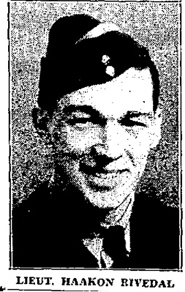Rivedal Is Made Lieutenant, Instructor in Great Britain
Local Member of RAF Will Teach Canadian Flyers
Second Lieut. Haakon Rivedal of the Royal Air Force, veteran of numerous bombing raids on Germany, wounded in action on one occasion, is now an instructor in an advanced flying school in York, England.
Lieutenant Rivedal is teaching advanced tactics to members of the Royal Canadian Air Force, young men, many of them from the United States, who have had their basic training in Canadian flying schools. The newly trained pilots, navigators and gunners are sent to England for their final training in preparation for actual battle.
Promoted to the rank of flight sergeant in May, Rivedal was then sent to a gunnery school in London, where he was enrolled in a course completed in August. At that time he was commissioned second lieutenant and assigned to the Instructor’s post.
Before being sent to the special school, Lieutenant Rivedal was a gunner in the bomber command of the RAF. Active in many British bombing attacks on Germany and France, he was wounded when struck by Nazi shell fragments in a raid over Hamburg, Oct. 28, 1941. After recovering fro his injuries, he took part in the bombing of Paris in March of 1942.
Lieutenant Rivedal is the son of Mr. and Mrs. Sivert Rivedal, 937 Jackson avenue northwest. His brother, Stanley, is serving with the U. S. Army in Oahu, Hawaii.
Source: Mason City Globe-Gazette, October 30, 1942 (photo included)
![]()
FLYERS SPEAK AT LIONS CLUB
Lt. Riveal and S. Sgt. Cookman Interviewed
Mason City Lions club members got a flyer’s-eye-view of the activities of the British and American air forces in Europ at their luncheon meeting Wednesday.
First Lt. Haakon Rivedal and S/Sgt. Dan Cookman, veterans of bombing missions from Norway to France, were guests of the club. Both flyers answered questions about their experiences, asked by various members of the group.
Sgt. Cookman, a tail gunner on a B-17 with a presidential citation, the purple heart and 32 missions to his credit, told the Lions that a tail gunner “mostly sits back there and prays” while his plane is over the target. His job started when enemy fighters attacked the big bomber, he said.
On D-Day, Sgt. Cookman said, his group flew 2 bombing missions to the Normandy beachhead. “I know my 2 brothers (First Lt. William Cookman and GM 2/C Jim Cookman) were fighting below me, and I was plenty worried about them.”
Asked if he thought he was in a better spot than his brothers, Sgt. Cookman said, “Sure – I was a lot safer!” Jim Cookman has recently been home on leave after 19 months overseas. Bill Cookman, at last reports, was in Germany with an infantry unit.
All 9 members of his bomber’s crew came through their quota of missions safely, Sgt. Cookman said, although he and the bombardier both were wounded by flak during a raid.
Lt. Rivedal, who joined the Royal Canadian air force in 1940 and completed 28 missions over Europe before transferring to the United States air force, is home on leave from Laredo, Texas, where he is now a gunnery instructor. He was overseas 3 ½ years.
Lt. Rivedal praised the spirit and courage of the people of Britain, who are in their 5th year of war, not very well fed, and living under the constant strain of the stiffest blackout regulations in Europe.
“Britain is a very poor nation,” the Norwegian-born Mason Cityan said. “It has only 1 major industry – coal mining – and must depend on its empire for sustenance.”
Guests at the meeting included John Peters of Des Moines, guest of C. W. Cowan; R. F. Clough, guest of W. A. Westfall; Luverne Hansen, guest of the Rev. A. N. Rogness, and A. V. O’Brien, guest of G. E. Mendon.
Source: The Globe-Gazette, Mason City, Iowa, Thursday, November 02, 1944, Page 8
![]()

